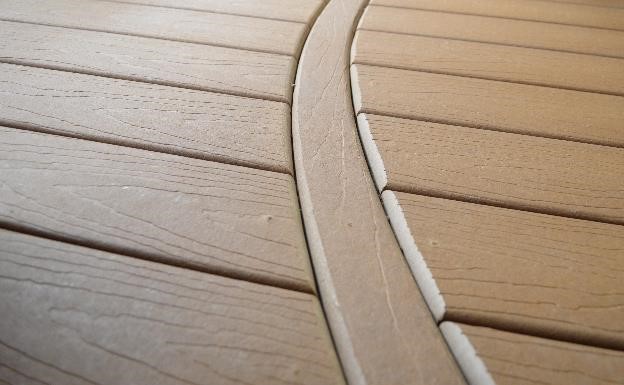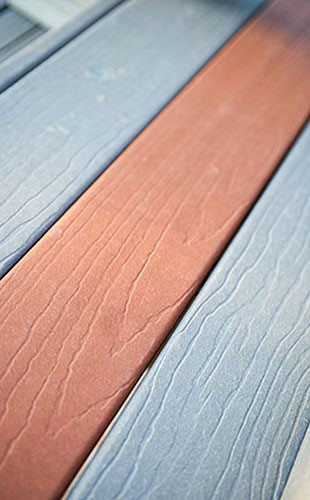According to a recent study by the Freedonia Group, alternative decking materials like wood-plastic composites are edging away at wood decking’s dominant market position. In large part, this is due to demand for decking that’s dependable and easier to maintain over time. Aluminum and composite decking are two alternatives that meet this need. They require less intensive upkeep than wood and feature a durable form, making it easier to create outdoor living spaces with lasting style.
If you’re like many of today’s homeowners, and the benefits of more hassle-free decking alternatives have you intrigued, then your decision may have already boiled down to these hardworking decking materials. Each has its own set of advantages, so how do you decide which one is right for you? Read on for a comparison of the two, and see why more people are moving towards composite decking as they sketch out the blueprints for their next project.

Which decking is easier to use?
In this category, composite decking comes out with a strong lead. The general form of composite decking is more pliable and easy to work with than aluminum due to its blend of wood particles and plastic components. Homeowners and contractors can install it with standard tools, and screw it down like traditional decking or attach it with hidden fasters. Contractors and DIYers can even rip, rout and bend the material into stunning curves and shapes by following manufacturer instructions.
Although aluminum is lighter than most decking alternatives and some brands can be cut with the same saws and blades as wood, its overall inflexibility lends itself to more standard, boxy designs. Some brands do offer modular, locking systems to help simplify installation. However, customization often remains challenging, requiring significant expertise.
Which decking has the aesthetic advantage?
While deck style often comes down to personal preference, if you want the heralded beauty of wood, composites are the way to go. Of the two materials, it more closely replicates wood’s timeless warmth and aesthetic. Brands now offer products with realistic wood-grain embossing and authentic, natural color options to match your decking to your wood preference and existing home style.
By comparison, aluminum decking is offered in a limited selection of colors and has a more uniform appearance. It touts a modern and sleek design that may be just right for some backyards, but its repeating lines and shiny surface fall short in replicating wood’s grain in look or feel.
Which decking withstands the elements better?
Aluminum decking is considered one of the most durable decking products in the market. The metal boards are scratch, rust and weather resistant, and they defend against staining, mildew and algae. These qualities make the decking an ideal choice for environments rich in moisture.

While some earlier composite decking materials did not fare as well in these categories, advanced materials, like ChoiceDek, have overcome this hurdle. By encapsulating wood fibers in plastic throughout the board, the decking prevents water from seeping into its core, even when cut. It can now be installed in applications with direct water contact like docks and pool surrounds without rotting, splitting or warping. Thanks to these improvements, both aluminum and composite decking can last for many years to come, making selection a matter of preference.
Which decking is easier to maintain?
Both materials do well in this category. Neither decking requires refinishing or staining to retain its beauty. Homeowners can also clean each type of decking fairly easily with a brush, water and mild detergent.
While there may be some lingering maintenance concerns about composite decking since earlier products were susceptible to moisture and decay, the reality is this worry can be erased with proper care and a material that resists moisture to its core.
Which decking is more cost efficient?
Composite decking is significantly less expensive than aluminum decking—one of today’s most expensive decking options on the market. While some manufacturers claim that the price for aluminum is lower over time when you factor in replacement costs, it’s important to remember that with the right composite deck comes a limited lifetime warranty, moisture resistance and reliable durability. A customer can take home an equally high-quality deck for a lower price.
Making a purchasing decision
If you’re looking for easy-to-install decking with a durable surface and budget-friendly price tag, composite decking is the answer. The Freedonia Group says it’s even expected to experience above average annual gains in demands through 2020. If you’re still not sure which decking material is best for you, make sure you compare the brands you are evaluating. Look for companies that stand behind the products they offer with more extensive warranties.